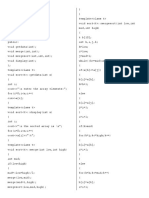0% found this document useful (0 votes)
11 views20 pagesDAA File Print
The document contains multiple practical programming exercises, including implementations of queue operations using linked lists, sorting algorithms (bubble sort, selection sort, insertion sort, quick sort), binary search tree traversals, and breadth-first search (BFS) for graph traversal. Each section includes the aim, code, and output for the respective program. The exercises are attributed to Anoorag Singh with a student ID of 2337373.
Uploaded by
studenthelp014Copyright
© © All Rights Reserved
We take content rights seriously. If you suspect this is your content, claim it here.
Available Formats
Download as DOCX, PDF, TXT or read online on Scribd
0% found this document useful (0 votes)
11 views20 pagesDAA File Print
The document contains multiple practical programming exercises, including implementations of queue operations using linked lists, sorting algorithms (bubble sort, selection sort, insertion sort, quick sort), binary search tree traversals, and breadth-first search (BFS) for graph traversal. Each section includes the aim, code, and output for the respective program. The exercises are attributed to Anoorag Singh with a student ID of 2337373.
Uploaded by
studenthelp014Copyright
© © All Rights Reserved
We take content rights seriously. If you suspect this is your content, claim it here.
Available Formats
Download as DOCX, PDF, TXT or read online on Scribd
/ 20























































































